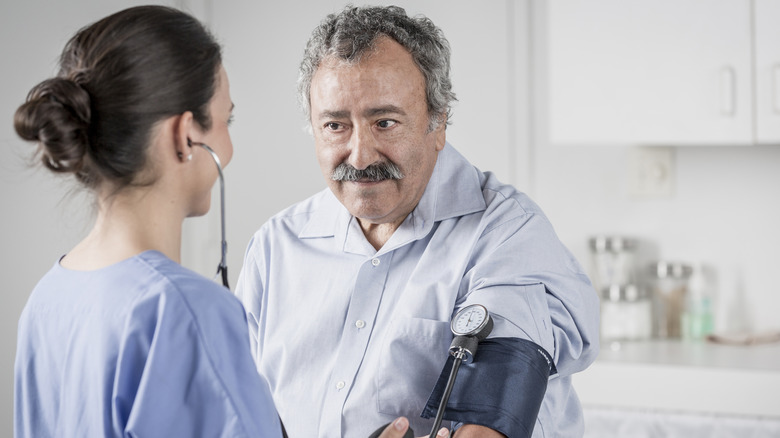The Unpopular Vegetable That Can Help Lower High Blood Pressure And Prevent Prostate Cancer At The Same Time
When you were a kid, grown-ups probably told you to eat your vegetables — and you might have thought that they were just being meddlesome. Turns out, they were giving you valid advice, especially if they told you to try some of the more underrated veggies on your plate. One of those underrated (and underappreciated) vegetables is the radish. According to a VeggieTracker poll of vegetable popularity among people in the United States (via Fox News), radishes came in second place for least-liked veggie. But they deserve a second chance.
Radishes aren't just crispy cruciferous produce picks for your salads and slaws. On the contrary, they may also be able to help you keep your blood pressure from rising, as well as provide protection against the risk of prostate cancer in men. The key to a radish's power lies in its wealth of antioxidants. According to the Mayo Clinic, antioxidant polyphenol may keep your arteries from getting inflexible and stiff, as well as make it harder for cancerous cells to develop, grow, and spread.
What's the mechanism behind antioxidants' potential ability to bring down blood pressure? A 2023 review in Antioxidants (Basel) sheds some light on how antioxidants work. After examining numerous studies, reviewers concluded that antioxidants, including polyphenols, may decrease oxidative stress. And oxidative stress is linked to — you guessed it — both heart disease and cancer, per a 2023 study in Antioxidants (Basel).
Lower systolic and diastolic numbers from a pink-red garden gem
While it's unlikely that eating radishes will magically cause an instant dip in your blood pressure, radishes — and their leaves and seeds — could have a positive effect on your hypertension over time.
A 2012 study in Nutrition Research and Practice found that hypertensive rats that were fed an extract made from radish leaves for five weeks ended up with lower systolic blood pressure readings. And in a 2006 study published in Fundamental and Clinical Pharmacology, three types of animals that ingested radish seed extract experienced antihypertensive outcomes.
Meanwhile, a 2018 study in the Journal of Agricultural and Food Chemistry focused on the potential of antioxidant-filled Sakurajima radishes (the world's largest radish variety) to support vascular health improvements in laboratory cells. After being introduced to the gigantic radishes, the cells responded in a way that indicated that the radishes might have antihypertensive impacts in real settings.
Lastly, a 2017 study in Food Science and Technology Research concentrated on the blood pressure lowering capabilities of dried powder from pickled, salty radishes on rats that were made hypertensive. Within two weeks, the rats ceased to present the artificially elevated systolic blood pressure.
Possible protection for the prostate gland
Even if you don't have high blood pressure, if you have a prostate, you may want to eat radishes to decrease your risk of prostate cancer. A 2019 review in Nutrients explored the tentative relationship between radishes and reduced risk of numerous medical conditions, including cancer. The researchers determined that, due to compounds like antioxidants, radishes seemed to produce a positive anticancer effect. This effect was seen in multiple cancer lines, including those related to prostate cancer. Specifically, extracts from radishes appeared to cause the death of prostate cancer cells.
The evidence surrounding radishes and lowered cancer risk isn't conclusive, however. In a 2014 review in Nutrition and Cancer, researchers explained that study results varied on how well antioxidants protected against the chance of being diagnosed with prostate cancer. Nonetheless, since prostate cancer is the second-leading cancer among men, according to the American Cancer Society, having any protection against it is a plus. And if that means taking your parents' advice and eating radishes, the potential health tradeoff could be worth a try.


